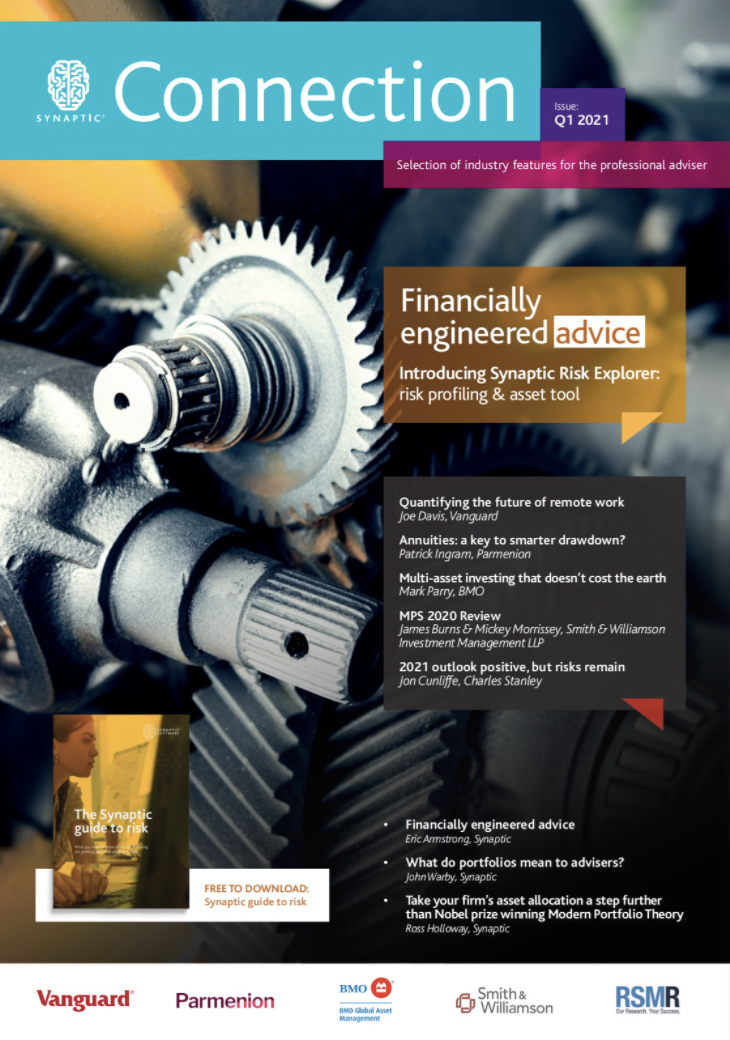In this edition...
- Financially engineered advice now standard Eric Armstrong, Client Director Synaptic Software Limited
- What do portfolios mean to advisers? John Warby, Senior Business Relationship Manager Synaptic Software Limited
- Take your firm’s asset allocation a step further than Nobel prize winning Modern Portfolio Theory Ross Holloway, Business Development Manager Synaptic Software Limited
- Risk Explorer infographic Editorial team, Synaptic Software Limited
- Quantifying the future of remote work Joe Davis, Global Chief Economist Vanguard
- Annuities: a key to smarter drawdown? Patrick Ingram, Head of Strategic Partnerships Parmenion
- Multi-asset investing that doesn’t cost the earth Mark Parry, Director, Head of Strategic and Technical Sales BMO
- MPS 2020 Review James Burns, Partner Smith & Williamson Investment Management LLP
- 2021 outlook positive, but risks remain Jon Cunliffe, Chief Investment Officer Charles Stanley
- The Chinese consumer revolution Janet Mui, Investment Director Brewin Dolphin
- EEE ESS GEE: The Sequel Steve Nelson, Head of research the lang cat
- Drivers and developments in sustainable multi-asset investing Maria Municchi, Fund Manager, Sustainable Multi Asset Fund Range M&G Investments
- RSMR Weekly Broadcast: the battle for content – deal or no deal? Richard O’Sullivan, Investment Research Manager RSMR
- COVID-19: Bringing operational financial strength into sharper focus Guy Vanner, Managing Director AKG
- Video - every adviser’s new best friend Martyn Pask, Director Asset TV

"We've been really pleased with our BMO Sustainable Universal MAP Range since their launch in 2019 – they've demonstrated that investing with a sustainable mindset can make sense from a performance perspective too."
Mark Parry, Director, Head of Strategic and Technical Sales
Responsible investing has gone mainstream, moving front and centre as awareness of Environmental, Social and Governance (ESG) risks and opportunities grow. Several drivers sit behind the shift, none more so than voices like David Attenborough and Greta Thunberg's on biodiversity loss and climate change. At the same time, we're living through a global pandemic – the spread of COVID-19 highlighting health and social issues. Governments are taking stronger action both individually and collectively through the likes of the Paris Climate Agreement, and companies are increasingly keen to adopt (and be seen to be adopting) more sustainable business practices.
Sustainability – a new talking point for advisers
More and more individuals are keen to do their bit. That often means through decisions as consumers but also the choices made when investing. Yes, achieving financial goals is crucial but there's greater recognition that a positive difference can be made along the way. For financial advisers this is likely to mean more clients are keen to explore sustainable options and the direction of regulatory change means that such discussions will become increasingly hard-wired into the planning process. Sustainable options will become fundamental components of any centralised investment proposition.
"Our impact reports give your clients real insight into the results of their investment choice, the positive difference investing sustainably can make and the impetus their money can provide in helping us encourage companies to operate more sustainably."
Nina Roth, Director, Responsible Investment
A boom for ESG funds
It should come as no surprise that the asset management industry has responded to these trends. According to figures from Morningstar, 233bn flowed into sustainable funds across Europe in 2020 – a 52% rise from the previous year. Over the same period, Europe saw 505 new ESG-orientated funds launched and 253 existing offerings repurposed.
Mind the greenwash
More choice is great news but there are challenges. Not least is a host of new jargon to get to grips with, a plethora of issues to assess and a wide range of associated approaches to consider. It can soon become confusing. Another challenge is differentiating between the ESG credentials of product providers. Many asset managers are vocal about their expertise, but concerns have been raised around 'greenwashing'. Have they only recently started looking at or talking about ESG? Do they have the right experience, skillset or resource to effectively apply ESG analysis in investment processes or drive positive change in companies through stewardship activities like engagement, for example?
Getting to grips with ESG
The Investment Association provides a useful framework to help advisers, providing a guide through fund and firm level components of 'Responsible Investment'. It can help with understanding and comparison with regards to exclusion, sustainability-focused and change-orientated labels and understand product provider approaches to stewardship and integration within investment processes.
A pioneer in responsible investment
At BMO GAM, our heritage in responsible investment is a long one. We launched our first ethically-screened fund in 1984 – it was Europe's first – and we have continued to develop a suite of related solutions ever since. Our 20+ strong Responsible Investment team is one of the biggest in the industry and they sit central to all our activities. Alongside working with investment managers, they help us maintain a leading voice through our thought leadership and exert influence on broader policies and regulation. Their sector knowledge meanwhile enables us to engage deeply with companies to drive change and integrate ESG factors into our decision-making processes. In 2020 for example, we engaged with 760 companies across 53 countries and achieved 343 milestones (instances of positive change). For a comprehensive lowdown on our activities look at our Responsible Investment Annual Review at bmogam.com/responsibleinvesting.
BMO Sustainable Universal MAP – redefining value
The BMO Sustainable Universal MAP range was launched in 2019 – a suite of risk-targeted, low-cost active multi-asset funds deigned to provide advisers with a practical tool for deployment within the advice process. At launch, the range covered Cautious, Balanced and Growth options with Defensive and Adventurous added to the line-up in March 2021. With an OCF capped at 0.39%, the funds may be priced at a point comparable with passive strategies, but each offers investors access to layers of active expertise and management. That includes active asset allocation – both tactical and strategic – by our Multi-Asset team and stock selection by underlying asset class specialists. The range's sustainable remit means investments are typically focused within areas like energy transition, resource efficiency and health & wellbeing – all long-term structural themes that provide tailwinds for quality and attractively valued businesses operating within them. The funds have clear exclusion criteria and avoid investing companies involved in fossil fuels, tobacco or weapons, or those with unsustainable business practices.
Understanding our impact
Each year we publish impact reports for our responsible and sustainably orientated strategies. They're designed to offer you and your and clients' insights into the impact of our investment decisions and stewardship activities. Within the reports we analyse the portfolios across key impact metrics such as carbon intensity or diversity. We also assess how the products and services provided by the companies we invest in align with the 17 Sustainable Development Goals (SDGs), which are designed to provide the world with a roadmap to a more sustainable future.
For more detail on our Responsible Investment and Multi-Asset capabilities, related insights or BMO Sustainable Universal MAP Range visit redefiningvalue.com
Key risks
Past performance should not be seen as an indication of future performance.
The value of investments and any income derived from them can go down as well as up as a result of market or currency movements and investors may not get back the original amount invested.
Screening out sectors or companies may result in less diversification and hence more volatility in investment values.
Sign up for updates
Keep up to speed with everything you need to know each quarter, by email or post.


